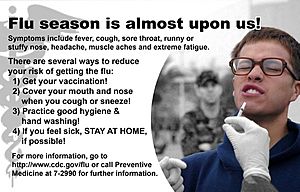Health facts for kids
Health is "a state of complete physical, mental, and social well-being and not merely the absence of disease" according to the World Health Organization (WHO). Physical is about the body. Mental is about how people think and feel. Social talks about how people live with other people. It is about family, work, school, and friends.

Contents
Aspects of health
Physical health
Physical fitness refers to good body health. It is dependent on genetic determinators and also on social, economic and ecological factors. That means, one´s genes are partly responsible for one´s physical health, but also other circumstances: where you live, how clean or polluted your water and the air around you is and also how good your social and medical system is. It is also the result of regular exercise, proper diet and nutrition, and proper rest for physical recovery. A person who is physically fit will be able to walk or run without getting breathless and they will be able to carry out the activities of everyday living and not need help. How much each person can do will depend on their age and whether they are a man or woman. A physically fit person usually has a normal weight for their height. The relation between their height and weight is called their Body Mass Index. A taller person can be heavier and still be fit. If a person is too heavy or too thin for their height it may affect their health.
Mental health
Mental health refers to a person's emotional and psychological well-being. "A state of emotional and psychological well-being in which an individual is able to use his or her thinking and emotional (feeling) abilities, function in society, and meet the ordinary demands of everyday life."
One way to think about mental health is by looking at how well a person functions. Feeling capable and efficient; being able to handle normal levels of stress, have good friends and family, and lead an independent life; and being able to "bounce back," or recover from hardships, are all signs of mental health.
Public health
Public health refers to trying to stop a disease that is unhealthy to the community, and does not help in long life or promote your health. This is fixed by organized efforts and choices of society, public and private clubs, communities and individuals.
It is about the health of many people, or everybody, rather than one person. Public health stops instead of encouraging a disease through surveillance of cases. To prevent being sick, it is good to act according to some simple advice: Hand washing, regular check-ups, vaccination programmes and clean water. When infectious diseases break out, washing hands for about 30 seconds may be especially important. Sometimes it is necessary to avoid masses of people or wear a surgical mask to protect yourself and to stop the spreading of the disease. Teaching people how to live healthily and educate them is also very important.
Related pages
Images for kids
-
Donald Henderson as part of the CDC's smallpox eradication team in 1966.
-
Nurses in Kokopo, East New Britain, Papua New Guinea
See also
 In Spanish: Salud para niños
In Spanish: Salud para niños






